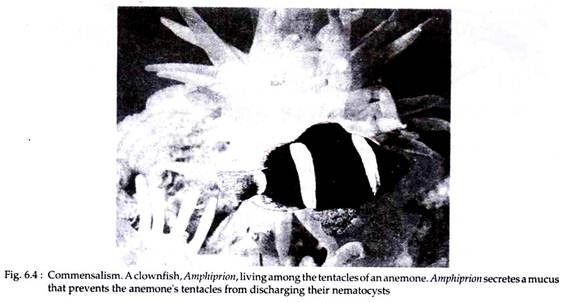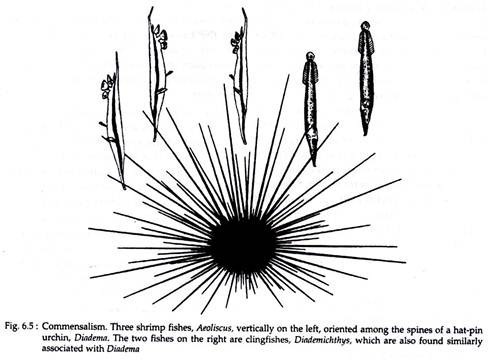In this article we will discuss about the examples of commensalism.
The term commensalism means “eating at the same table”. In commensalism, one partner or the commensal benefits from the association but the other or host is neither helped nor harmed. In such relationship, the spatial proximity of the two partners permits the commensal to feed on food captured or ingested by the host which are “wasted” or otherwise not consumed by the latter.
In addition to sharing of food, commensalism also provides shelter.
ADVERTISEMENTS:
Examples of Commensalism:
(i) In human, Entamoeba gingivalis lives in the mouth where it feeds on bacteria, food particles and dead epithelial cells but it never harms healthy tissues.
(ii) In marine environment, commensalism is found between clownfish and large sea anemones (Fig. 6.4). While living within the tentacular zone of the anemone, the fishes never get injured by the host’s stinging nematocysts because they secret a temporary mucous envelope around themselves. Rather, the fish get shelter, protection as well as food from their hosts.
(iii) An unique behavioural pattern is shown by the shrimp fishes and cling fishes that live commensalistically with the tropical hat-pin urchin Diadema. The fishes hover perpendicularly with their tubular snouts pointed toward the body of the urchin and their elongated bodies held parallel to the spines.
ADVERTISEMENTS:
In this position, the fishes are least apt to be pierced by the spines of the urchin, rather, when the spines move, the fishes sway with the movement (Fig. 6.5).
Commensalism may be facultative, because the commensal is not directly dependent on the host metabolically. Hence, commensals, when separated from the host, still survive and carry on all biologic activities. For example, stalked ciliates of the genus Vorticella are frequently found on small crustaceans but they survive equally well on sticks in the same pond. However, some commensalism is obligatory.
ADVERTISEMENTS:
For example, another ciliate Epistylis spp are found only on some crustaceans but never on other hosts.

